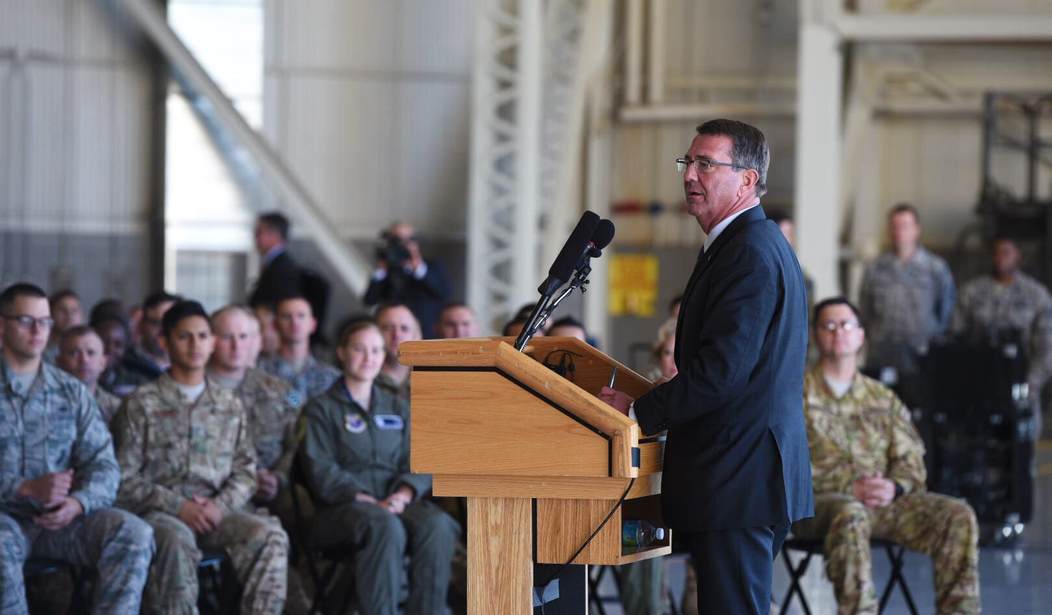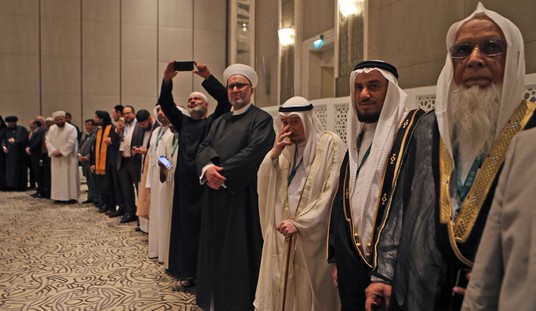Defense Secretary Ashton Carter stopped at Minot Air Force Base in North Dakota today to tell airmen that “America’s nuclear deterrence is the bedrock of our security” and “the highest priority mission” of the Defense Department.
“The confidence that you’re ready to respond is what stops potential adversaries from using nuclear weapons against the United States or our allies in the first place. It’s the whole point,” Carter said.
“…I realize it feels at times that most people don’t often think about your mission. Which I know can be frustrating. Even though, in a way, it’s a good thing. Because it means you’re doing your job. It’s a paradox that’s not easily reconciled, but one that I see and I understand. Because whether they recognize it or not, our entire country and more depends on you. Since we’ve never found a perfect defense against nuclear weapons, only you can truly deter nuclear attacks that would result in enormous devastation.”
Carter noted that “many around the world and even some in the United States are stuck in the Cold War in their thinking.”
“One way the nuclear landscape has changed — we didn’t build new types of nuclear weapons or delivery systems for the last 25 years, but others did,” he said. “…Now, Russia has long been a nuclear power, but Moscow’s recent saber-rattling and building of new nuclear weapons systems raises serious questions about its leader’s commitment to strategic stability, their regard for long-established abhorrence of using nuclear weapons and whether they respect the profound caution that Cold War-era leaders showed with respect to brandishing nuclear weapons.”
In North Korea, the secretary said, Pyongyang’s “nuclear and missile provocations underscore that a diverse and dynamic spectrum of nuclear threat still exists, so our deterrence must be credible and extended to our allies in the region.”
“It’s also why we continue to build more robust ballistic missile defenses oriented toward the North Korean threat, deploying ground-based interceptors in Alaska and California and also agreeing with our Korean allies to deploy the Terminal High Altitude Area Defense System, or THAAD, in the Republic of Korea,” he added. “And we back all of that up with the commitment that any attack on America or allies will not only be defeated, but that any use of nuclear weapons will be met with an overwhelming and effective response.”
Carter noted that India has “generally shown responsible behavior with its nuclear technology” and China “also conducts itself professionally in the nuclear arena, despite growing its arsenal in both quality and quantity.”
“In Iran, their nuclear aspirations have been constrained and — and transparency over their activities increased by last year’s nuclear accord, which, as long as it continues to be implemented, will verifiably prevent Iran from acquiring a nuclear weapon,” he said.
“And the last example I’ll cite is Pakistan, where nuclear weapons are entangled in a history of tension. And while they’re not a threat tot he United States directly, we work with Pakistan to ensure stability.”
The administration’s FY 2017 budget includes $19 billion for the “nuclear enterprise.”
Carter said intercontinental ballistic missiles (ICBMs) and Ohio class ballistic missile submarines need to be replaced and aircraft fleets need to be updated.
“The fact is, most of our nuclear weapon delivery systems have already been extended decades beyond their original expected service lives,” he said. “So it’s not a choice between replacing these platforms or keeping, it’s really a choice between replacing them or losing them. That would mean losing confidence in our ability to deter, which we can’t afford in today’s volatile security environment.”
“…Unfortunately, given what we see in today’s security environment, it’s also likely that our children and their children will probably have to live in a world where nuclear weapons exist.”
Carter is visiting Kirtland Air Force Base and nuclear weapons labs at Sandia and Los Alamos in New Mexico this week.









Join the conversation as a VIP Member